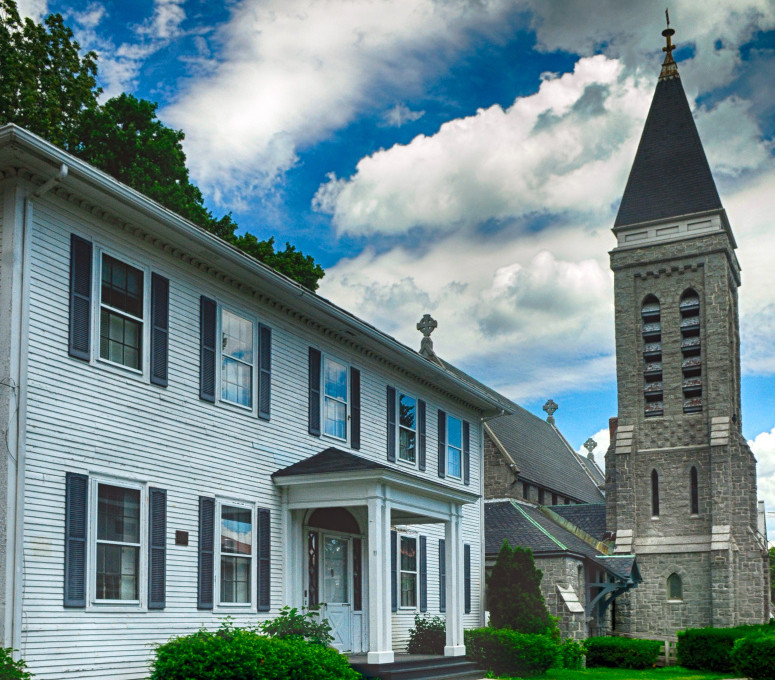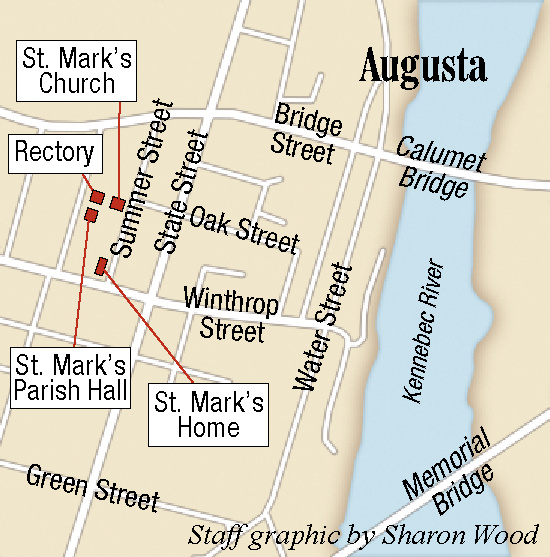AUGUSTA — Several religious leaders said on Tuesday that proposed city zoning ordinance changes would infringe on their members’ constitutional rights to practice religion and put restrictions on social services for the needy they say are a core part of how they worship, and one leader hinted at possible legal action against the city.
Where in the city to help people who are homeless and hungry, without putting residents and downtown businesses at a disadvantage, was also a big topic of discussion at a Planning Board public hearing held Tuesday to discuss zoning changes proposed to clarify definitions of group homes, rooming houses, religious uses and homeless shelters.
One proposal would split the existing definition of religious activities in the ordinance into two definitions — one for smaller churches, temples, synagogues, mosques or other nonprofit religious facilities, which would be allowed within neighborhoods; and another for large such facilities with worship space for 200 or more people, recommended to be allowed only in the city’s rural or commercial areas, not in residential neighborhoods.
Social services, under the draft definition discussed Sept. 13, would not be allowed to be provided in new smaller religious facilities permitted in neighborhoods, although existing services would be grandfathered and allowed to continue.
Rabbi Erica Asch read a statement signed by several religious leaders from multiple denominations in Augusta that said social services, such as providing food, clothing and shelter to those in need, define what many of them see as their core mission. They also said they reject any attempt by the government to define what their primary or secondary roles are.
The Rev. Erik Karas, priest in charge of St. Mark’s Church and pastor of Prince of Peace Lutheran Church, said no government entity has any business telling a religious organization what its primary or secondary functions are, or trying to define what is or isn’t legitimate worship.
He said he hopes the city will change course but warned if it does not, he expects to spend some time in jail for civil disobedience, and law firms already have offered to file suit against the city, for free, on their behalf.
“This is not the path we wanted to take, and it’s not too late to take another path,” Karas said, warning against impinging on the free practice of religion.
Ward 1 City Councilor Linda Conti said the city’s attorney is prepared for a lawsuit and won’t let the city adopt anything that would be overturned easily. Churches must be good neighbors too, she said, adding that the city can regulate things involving churches without infringing on the right to practice religion freely.
The changes were proposed in response to concern about what could happen to the prominent west side St. Mark’s Church property, which is for sale.
Last month city councilors approved a moratorium temporarily banning consideration of any new group, boarding or rooming houses for 180 days in two major zoning districts in the city, including the district encompassing the St. Mark’s property.
City leaders said the moratorium was needed to give the city time to clarify zoning rules, but St. Mark’s leaders said the moratorium would interfere with their efforts to sell the property and prolong the financial burden of maintaining the property, money they said would be better spent on the church’s mission of helping people in need. The Planning Board was directed by the City Council to study the issue and make recommendations back to the council.
Several residents of the west side neighborhood which abuts the church property said the neighborhood already has more than its share of group homes and is reaching a tipping point, beyond which the neighborhood culture and character would deteriorate, potentially beyond repair.
Meanwhile, the Planning Board received three letters from downtown business and building owners, some of whom spoke Tuesday, saying the Bread of Life soup kitchen on Water Street, which at meal times often has groups of people congregating nearby waiting to get inside, is harming downtown. They also urged board members not to make changes that would allow an expansion of social services, such as shelters or soup kitchens, downtown, because it would hamper the ongoing revitalization there.
“Potential customers do not come here as it is because of dealing with groups of people waiting to get into an already taxed soup kitchen,” wrote David Hopkins, owner of Merkaba Sol, a business next to Bread of Life on Water Street, into which he said he has put all his life savings. “We fully understand the need for these services but there are other areas in which it would be a better fit. I urge the board to tread carefully with the decision and look at all other options for this. We are a hard working community down here and some will be forced to leave if this change is made.”
Jesse Patkus, a downtown building owner who said he recently also purchased a house in the west side neighborhood, and Stacey and Chris Shaw, owners of The Black and Tan restaurant on Bridge Street, wrote similar letters to the board.
St. Mark’s is looking to sell the church, the adjacent rectory and its parish hall, which is home to the Augusta Food Bank and church-organized operations providing those in need with free clothing and other essential items.
It is simultaneously seeking proposals from organizations to which it could give the former St. Mark’s Home with an endowment of about $340,000 to continue its mission of helping area people in need.
City officials including Mayor David Rollins and Ward 1 City Councilor Linda Conti have expressed concern about how the property could be used, saying they heard Bread of Life Ministries has submitted a proposal for the property, and if it acquires some or all of the St. Mark’s site, it could move its homeless shelter from Hospital Street, its soup kitchen from Water Street, or both, to the site. Rollins said previously he thinks a homeless shelter and soup kitchen would not be allowed there under the current zoning nor be compatible with the largely residential neighborhood or Lithgow Public Library, both of which the church property abuts.
Planning Board members and the city staff had not yet responded to most of the issues raised by press time Tuesday, as the meeting continued.
Resident Ed Hastings, a school board member, said the effect on religious organizations was likely an unintended consequence of the language changes, and said he didn’t believe anyone at Augusta City Center for Tuesday’s meeting, or on the City Council, would even entertain the thought of interfering with church activities.
Keith Edwards — 621-5647
Twitter: @kedwardskj
Send questions/comments to the editors.





Success. Please wait for the page to reload. If the page does not reload within 5 seconds, please refresh the page.
Enter your email and password to access comments.
Hi, to comment on stories you must . This profile is in addition to your subscription and website login.
Already have a commenting profile? .
Invalid username/password.
Please check your email to confirm and complete your registration.
Only subscribers are eligible to post comments. Please subscribe or login first for digital access. Here’s why.
Use the form below to reset your password. When you've submitted your account email, we will send an email with a reset code.